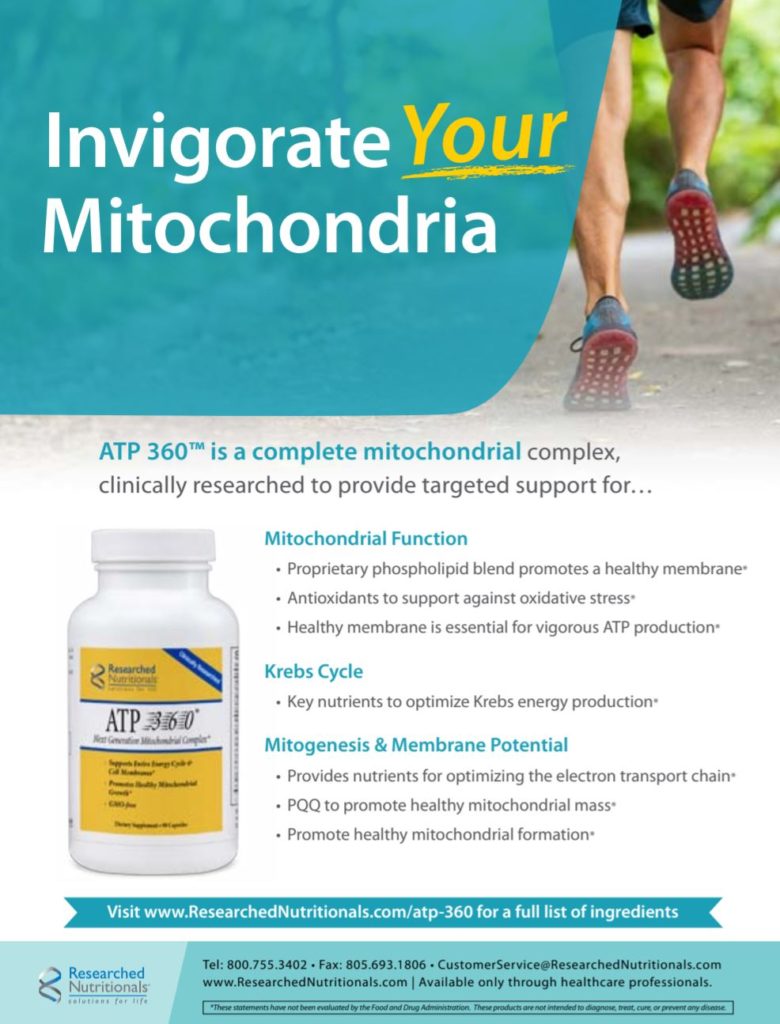…article continued:
Research is also working to identify metabolomic markers that can objectively assess nutrient status, food intake, and the biological effects of foods. As noted, an issue of concern has been the recommendation of nutrients based on urine testing. Overall, many nutrients lack an ideal or consensus biomarker for deficiency diagnosis. Evaluation of organic acids primarily highlights that there may be a nutrient need or other issue impacting a metabolic pathway. Though not generally diagnostic, functional medicine testing may identify areas of concern. All laboratory assessments should be evaluated in the context of a full medical history and exam, and other contributing factors.

Applied Metabolomics Going Forward
While conventional medicine has largely ignored urine metabolites outside of serious inborn errors of metabolism (i.e., PKU, MSUD, etc.) or a few single markers, functional medicine or integrative nutrition has certainly been ahead of the curve in its excitement and interest in using metabolomics, specifically urine organic acids. Functional medicine has laid significant groundwork for providing a format for applying metabolomics, though it has not fully kept up with current research and accepted standards. Applied Metabolomics, as it currently stands, offers patients insight and additional information on their metabolic status. Though certainly, some criticism may be that it lacks clinically applied evidence, it is important to remember that in functional medicine it is primarily being used to adjust lifestyle, exercise, diet, or guide supplementation of nutrients or botanicals, and not to determine the use of interventions that carry with them a significant risk of harm, such as pharmaceutical agents. Patients have control over these extrinsic factors, making changes personalized and participatory. At the same time, clinicians and integrative and functional medicine organizations should be transparent in identifying the support, or lack thereof, for the information they are presenting to justify their suggested treatment plans. Support of a single study cannot override consensus science.
Another exciting advancement in the utilization of metabolomics data is the evolution of machine learning and artificial intelligence informatics platforms. As metabolome databases become more robust and standardized, the use of advanced analytical technology will likely allow for more comprehensive pattern analysis and clinical contextualization of the data set generated when a metabolomics test is performed, providing more evidence-based recommendations based on the subject’s data and, ultimately, more impactful and efficacious therapeutic interventional options for the treating clinician to consider.
Metabolomics is improving our understanding of physiology, what is normal, what is normal for each individual, and what may identify impairments. It can characterize key markers in specific processes and pathways, physiology, impact of diet and microbiome metabolism, etc., all helping to identify a client’s individual metabolism and better personalize treatments. While conventional medicine has primarily looked at laboratory markers that provide a diagnosis, functional medicine has looked at a broader picture of function. Metabolomics offers a pathway to move forward in the quest for truly precise and personalized medicine.
References
1. Kell DB, Oliver SG. The metabolome 18 years on: a concept comes of age. Metabolomics, 2016. 12(9): p. 148.
2. Pico C, et al. Biomarkers of Nutrition and Health: New Tools for New Approaches. Nutrients. 2019. 11(5).
3. Trivedi DK, Hollywood KA, Goodacre R. Metabolomics for the masses: The future of metabolomics in a personalized world. New Horiz Transl Med, 2017. 3(6): p. 294-305.
4. Rijswijk M, et al. The future of metabolomics in ELIXIR [version 1; referees: 1 approved, 1 approved with reservations]. F1000 Research, 2020.
5. Shibata K, Sakamoto M. Urinary Branched-Chain 2-Oxo Acids as a Biomarker for Function of B-Group Vitamins in Humans. J Nutr Sci Vitaminol (Tokyo), 2016. 62(4): p. 220-228.
6. Duran M, Wadman SK. Thiamine-responsive inborn errors of metabolism. J Inherit Metab Dis, 1985. 8 Suppl 1: p. 70-5.
7. Janssen JJE, et al. Mito-Nuclear Communication by Mitochondrial Metabolites and Its Regulation by B-Vitamins. Front Physiol, 2019. 10: p. 78.
8. Nix H. A National Geographic Information System – An Achievable Objective? 1990, Keynote address, Aurisa.
9. Bent S, et al. Identification of urinary metabolites that correlate with clinical improvements in children with autism treated with sulforaphane from broccoli. Mol Autism, 2018. 9: p. 35.
10. Srikantha P, Mohajeri MH. The Possible Role of the Microbiota-Gut-Brain-Axis in Autism Spectrum Disorder. Int J Mol Sci, 2019. 20(9).
11. Sharma K, et al. Metabolomics reveals signature of mitochondrial dysfunction in diabetic kidney disease. J Am Soc Nephrol, 2013. 24(11): p. 1901-12.
12. Abbiss H, Maker GL, Trengove RD. Metabolomics Approaches for the Diagnosis and Understanding of Kidney Diseases. Metabolites, 2019. 9(2).
13. Dong S, et al. Urinary metabolomics analysis identifies key biomarkers of different stages of nonalcoholic fatty liver disease. World J Gastroenterol, 2017. 23(15): p. 2771-2784.
14. Yang QJ, et al. Serum and urine metabolomics study reveals a distinct diagnostic model for cancer cachexia. J Cachexia Sarcopenia Muscle, 2018. 9(1): p. 71-85.
15. Friedrich N, et al. Identification of urine metabolites associated with 5-year changes in biomarkers of glucose homoeostasis. Diabetes Metab, 2018. 44(3): p. 261-268.
16. Gall WE, et al. Alpha-hydroxybutyrate is an early biomarker of insulin resistance and glucose intolerance in a nondiabetic population. PLoS One, 2010. 5(5): p. e10883.
17. Kim YJ, et al. Integration of Traditional and Metabolomics Biomarkers Identifies Prognostic Metabolites for Predicting Responsiveness to Nutritional Intervention against Oxidative Stress and Inflammation. Nutrients, 2017. 9(3).
18. Il’yasova D, Scarbrough P, Spasojevic I. Urinary biomarkers of oxidative status. Clin Chim Acta, 2012. 413(19-20): p. 1446-53.
19. Doessegger L, et al. Increased levels of urinary phenylacetylglycine associated with mitochondrial toxicity in a model of drug-induced phospholipidosis. Ther Adv Drug Saf, 2013. 4(3): p. 101-14.
20. Kistner S, et al. An NMR-Based Approach to Identify Urinary Metabolites Associated with Acute Physical Exercise and Cardiorespiratory Fitness in Healthy Humans-Results of the KarMeN Study. Metabolites, 2020. 10(5).
21. Yousri NA, et al. A systems view of type 2 diabetes-associated metabolic perturbations in saliva, blood and urine at different timescales of glycaemic control. Diabetologia, 2015. 58(8): p. 1855-67.
22. Cheng S, et al. Potential Impact and Study Considerations of Metabolomics in Cardiovascular Health and Disease: A Scientific Statement From the American Heart Association. Circ Cardiovasc Genet, 2017. 10(2).
23. Johnson LE. Overview of Vitamins. 2019 [cited 2020; Available from: https://www.merckmanuals.com/professional/nutritional-disorders/vitamin-deficiency,-dependency,-and-toxicity/overview-of-vitamins?redirectid=12402.
24. (US), I.o.M. Scientific Evaluation of Dietary Reference Intakes and its Panel on Folate, Other B Vitamins, and Choline. Dietary Reference Intakes for Thiamin, Riboflavin, Niacin, Vitamin B6, Folate, Vitamin B12, Pantothenic Acid, Biotin, and Choline. 1998 [cited 2020; Available from: https://www.ncbi.nlm.nih.gov/books/NBK114310/.
25. Dhir S, et al., Neurological, Psychiatric, and Biochemical Aspects of Thiamine Deficiency in Children and Adults. Front Psychiatry, 2019. 10: p. 207.
26. Romanski SA, McMahon MM. Metabolic acidosis and thiamine deficiency. Mayo Clin Proc, 1999. 74(3): p. 259-63.
27. Prevention, C.f.D.C.a. Lactic Acidosis Traced to Thiamine Deficiency Related to Nationwide Shortage of Multivitamins for Total Parenteral Nutrition — United States, 1997. 1997 10.18.2020]; Available from: https://www.cdc.gov/mmwr/preview/mmwrhtml/00047949.htm.
28. Majchrzak D, et al., B-vitamin status and concentrations of homocysteine in Austrian omnivores, vegetarians and vegans. Ann Nutr Metab, 2006. 50(6): p. 485-91.
29. Gamarra Y, et al. Pyroglutamic acidosis by glutathione regeneration blockage in critical patients with septic shock. Crit Care, 2019. 23(1): p. 162.
30. Kennedy DO. B Vitamins and the Brain: Mechanisms, Dose and Efficacy–A Review. Nutrients, 2016. 8(2): p. 68.
31. Kaluzna-Czaplinska J, Socha E, Rynkowski J. B vitamin supplementation reduces excretion of urinary dicarboxylic acids in autistic children. Nutr Res, 2011. 31(7): p. 497-502.
32. Creeke PI, et al. Whole blood NAD and NADP concentrations are not depressed in subjects with clinical pellagra. J Nutr, 2007. 137(9): p. 2013-7.
33. Rios-Avila L, et al. A mathematical model of tryptophan metabolism via the kynurenine pathway provides insights into the effects of vitamin B-6 deficiency, tryptophan loading, and induction of tryptophan 2,3-dioxygenase on tryptophan metabolites. J Nutr, 2013. 143(9): p. 1509-19.
34. Ueland PM, et al. Direct and Functional Biomarkers of Vitamin B6 Status. Annu Rev Nutr, 2015. 35: p. 33-70.
35. Ganji V, Kafai MR. Population Reference Values for Serum Methylmalonic Acid Concentrations and Its Relationship with Age, Sex, Race-Ethnicity, Supplement Use, Kidney Function and Serum Vitamin B12 in the Post-Folic Acid Fortification Period. Nutrients, 2018. 10(1).
36. Cooperman JM, Lopez R. The role of histidine in the anemia of folate deficiency. Exp Biol Med (Maywood), 2002. 227(11): p. 998-1000.
37. Sobczynska-Malefora A, Harrington DJ. Laboratory assessment of folate (vitamin B9) status. J Clin Pathol, 2018. 71(11): p. 949-956.
38. Mock NI, et al. Increased urinary excretion of 3-hydroxyisovaleric acid and decreased urinary excretion of biotin are sensitive early indicators of decreased biotin status in experimental biotin deficiency. Am J Clin Nutr, 1997. 65(4): p. 951-8.
39. Perry CA, et al. Pregnancy and lactation alter biomarkers of biotin metabolism in women consuming a controlled diet. J Nutr, 2014. 144(12): p. 1977-84.
40. Sealey WM, et al. Smoking accelerates biotin catabolism in women. Am J Clin Nutr, 2004. 80(4): p. 932-5.
David M. Brady, ND, DC, CCN, DACBN, IFMCP, FACN has 30 years of experience as an integrative practitioner and over 25 years in health sciences academia. He is a licensed naturopathic medical physician in Connecticut and Vermont, is board certified in functional medicine and clinical nutrition, a fellow of the American College of Nutrition, and completed his initial clinical training as a doctor of chiropractic. Dr. Brady has been the chief medical officer of Designs for Health, Inc. for 17 years. He is also one of the founders of Diagnostic Solutions Labs and serves as the chief medical officer for the lab. He was the long-time vice president for health sciences and director of the Human Nutrition Institute and continues to serve as an associate professor of clinical sciences at the University of Bridgeport in Connecticut. He has appeared on the plenary speaking panel of some of the largest and most prestigious conferences in the field, including IFM, ACAM, A4M, ACN, IHS, AANP, AIHM and many more. He is in clinical practice at Whole Body Medicine in Fairfield, CT, specializing in functional, nutritional, and metabolic medicine.
Betsy Redmond, PhD, MMSc, RDN has worked in laboratory content development and research for more than 15 years and also runs a private practice nutrition and consulting business. She holds a Masters in Clinical Nutrition from Emory University and PhD in nutrition from the University of Georgia. Additionally, she is a co-developer of the Academy of Nutrition and Dietetic’s Integrative and Functional Medical Nutrition Therapy (IFMNT) Radial, that was recently published in the textbook Integrative and Functional Medical Nutrition Therapy (2020). Her focus has been on evaluating evidence and literature support for IFMNT claims. betsy.redmond@diagnosticsolutionslab.com





